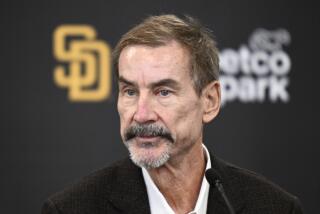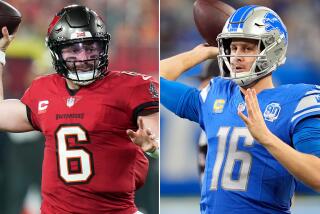BASEBALL / ROSS NEWHAN : BASEBALL PLAYOFFS : McGriff Factor an Obvious One
- Share via
PHILADELPHIA — On July 18, reacting to the Atlanta Braves’ acquisition of Fred McGriff from a clearing house otherwise known as the San Diego Padres, Manager Dusty Baker of the San Francisco Giants said:
“My opinion is that they got McGriff two months too late.”
Baker spoke with the advantage of a nine-game lead over the Braves in the National League West, but he was clearly at a disadvantage Thursday night, when the closest he got to Game 2 of the NL playoffs was the television screen.
What he saw, if he was watching, was a majestic, two-run homer by McGriff in the first inning that dented the Game 1 euphoria of the Philadelphia Phillies, propelled the Braves to a 14-3 victory, and sent the tied series to Atlanta, where the Phillies must face Tom Glavine, John Smoltz and Steve Avery again.
McGriff? On a night when the Braves restored their 104-victory dominance and hit four home runs, maybe his 438-foot drive into the upper deck in right field wasn’t the difference.
Maybe he wasn’t the difference as the Braves set fire to Baker’s calendar by winning 51 of 68 games after his arrival to outlast the Giants in the NL West’s Great Race.
Maybe?
“Maybe you believe in coincidence,” said Greg Maddux, who perpetuated his Cy Young Award form in Thursday’s easy victory.
“Freddie has been a tremendous hitter from Day 1, and I don’t think you can overemphasize his role as a catalyst,” Maddux said.
Perhaps, but McGriff thinks it has been overemphasized.
“It’s ridiculous to think one man could make the difference or could win all those games,” McGriff said. “You could go down our lineup. We had contributions from guys who are considered stars and the guys who aren’t.
“The thing I may have done is take some of the pressure off some of those guys. (Terry) Pendleton and (David Justice) were having kind of off years, so when I came the attention shifted to me.
“There was less pressure on the others. Everyone wanted to see what I was going to do.”
The first baseman batted .310 with the Braves, hitting 19 of his 37 homers and driving in 55 of his 101 runs. Atlanta was batting a league-low .245 when McGriff arrived and finished at .262, averaging 5.8 runs over those final 68 games.
“It stands to reason that if you add a hitter of his caliber to the middle of the lineup, everyone becomes better,” said Ron Gant. “There’s kind of a chain reaction. Everyone gets better pitches. There’s no one to pitch around.”
Gant went from fifth to third in the batting order, Pendleton from third to sixth and Justice from fourth to fifth as McGriff became the cleanup hitter.
Chain reaction?
Gant hit 16 of his 36 homers and collected 62 of his 117 runs batted in in the A.M. (after McGriff). Justice batted .310, hit 19 of his 40 homers and drove in 59 of his 120 RBIs. Pendleton awoke to hit .297, slug 11 of his 17 homers and drive in 46 of his 84 runs.
It’s a two way street, of course.
The Braves, Justice points out, won two consecutive pennants without McGriff and Maddux. A good team became better, he said, and McGriff benefited as much as the hitters around him.
“The way I’d put it is that we all found a comfort zone,” said Justice, who became the fourth Atlanta player to hit 40 homers and drive in 100 or more runs in a season. He helped the Braves become the first National League team since 1970 to have three players with 100 RBIs.
“If you’re holding four aces, it was like being dealt a fifth,” he said of the McGriff acquisition, which proved to address more than the standings.
The clubhouse previously was a potential caldron of steaming issues from management’s unhappiness with Pendleton’s weight to his mid-game walkout when Marvin Freeman failed to retaliate after a Cincinnati pitcher had hit an Atlanta batter, to the Deion Sanders contract holdout, to the Otis Nixon trade demands when he temporarily lost his job to Sanders, to public comments by Glavine criticizing teammates for failing to play up to capability.
McGriff’s quiet leadership helped defuse some of it, his loud bat some of the rest. He brought the Braves back from a 5-0 deficit to an 8-5 victory over the St. Louis Cardinals with a three-run homer in his first game, and that was ignition.
“He changed a lot of attitudes,” said Sid Bream, who lost his first base job to McGriff. “It was something we needed. I’m not saying it couldn’t have been done with the people we had, but he was the guy who did it.”
Glavine agreed. “We’ve definitely been a different team,” he said. More dominant. More confident. Two months too late? Dusty Baker now wishes it hadn’t been so soon.
More to Read
Go beyond the scoreboard
Get the latest on L.A.'s teams in the daily Sports Report newsletter.
You may occasionally receive promotional content from the Los Angeles Times.










